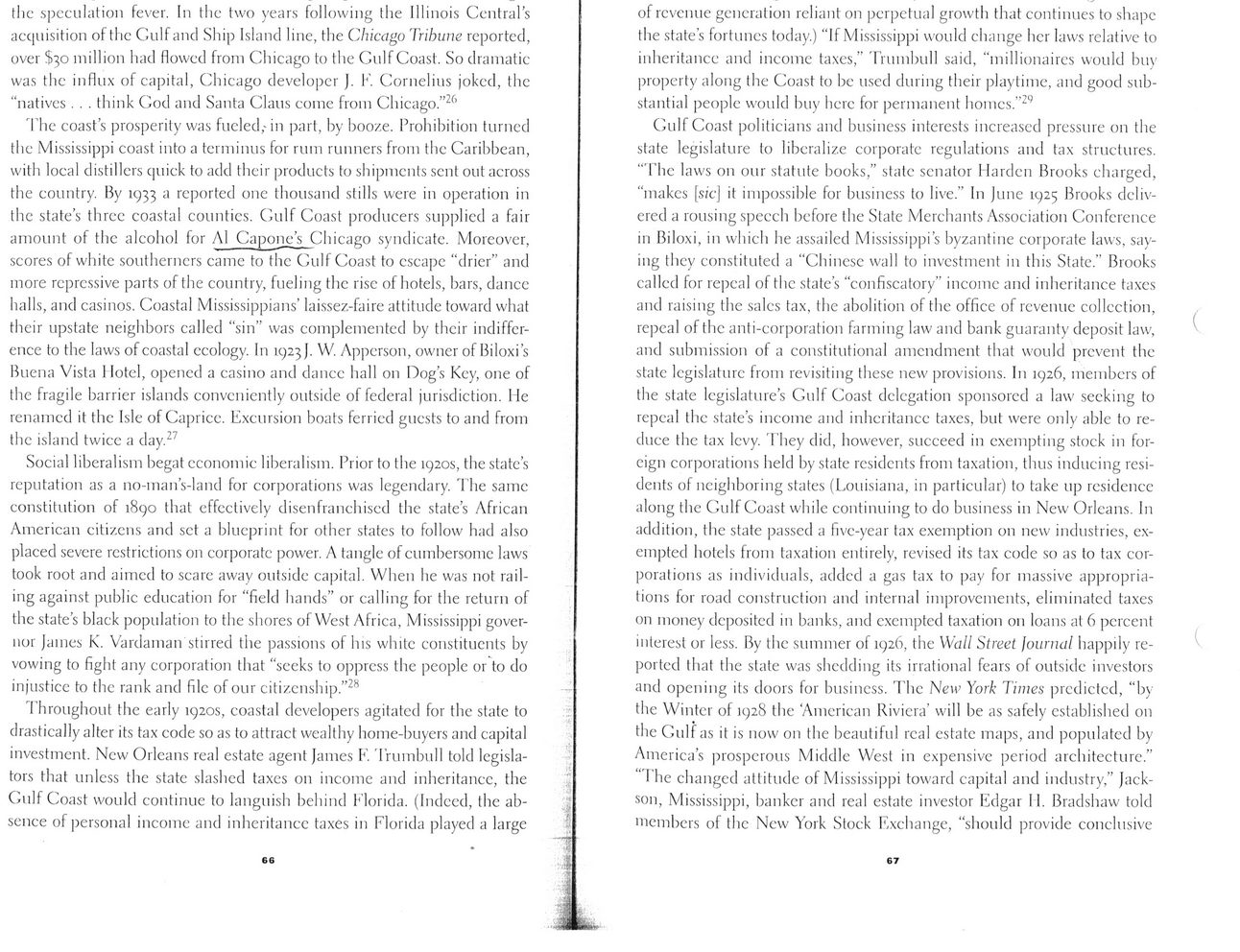This text was obtained via automated optical character recognition.
It has not been edited and may therefore contain several errors.
the speculation fever. In the two years following the Illinois Central’s acquisition of the Gulf and Ship Island line, the Chicago Tribune reported, over $30 million had flowed from Chicago to the Gulf Coast. So dramatic was the influx of capital, Chicago developer ). K Cornelius joked, the “natives . . . think Cod and Santa Claus come from Chicago.”26 The coast’s prosperity was fueled,-in part, by booze. Prohibition turned the Mississippi coast into a terminus for rum runners from the Caribbean, with local distillers quick to add their products to shipments sent out across the country. By 1933 a reported one thousand stills were in operation in the state’s three coastal countics. Gulf Coast producers supplied a fair amount of the alcohol for A1 Capone’s Chicago syndicate. Moreover, scores of white southerners came to the Gulf Coast to escape “drier” and more repressive parts of the country, fueling the rise of hotels, bars, dance halls, and casinos. Coastal Mississippians’ laissez-faire attitude toward what their upstate neighbors called “sin” was complemented by their indifference to the laws of coastal ecology. In 1923). W. Apperson, owner of Biloxi’s Buena Visla I Iotel, opened a casino and dance hall on Dog’s Key, one of the fragile barrier islands conveniently outside of federal jurisdiction. He renamed it the Isle of Caprice. Excursion boats ferried guests to and from the island twice a day.27 Social liberalism begat economic liberalism. Prior to the 1920s, the state’s reputation as a no-man’s-land for corporations was legendary. The same constitution of 1890 that effectively disenfranchised the state’s African American citizens and set a blueprint for other states to follow had also placed severe restrictions on corporate power. A tangle of cumbersome laws took root and aimed to scare away outside capital. When he was not railing against public education for “field hands” or calling for the return of the state’s black population to the shores of West Africa, Mississippi governor James K. Vardanian'stirred the passions of his white constituents by vowing to fight any corporation that “seeks to oppress the people or to do injustice to the rank and file of our citizenship.”28 Throughout the early 1920s, coastal developers agitated for the state to drastically alter its tax code so as to attract wealthy home-buyers and capital investment. New Orleans real estate agent James F. Trumbull told legislators that unless the state slashed taxes 011 income and inheritance, the Gulf Coast would continue to languish behind Florida. (Indeed, the absence of personal income and inheritance taxes in Florida played a large 66 of revenue generation reliant on perpetual growth that continues to shape the state’s fortunes today.) “If Mississippi would change her laws relative to inheritance and income taxes,” Trumbull said, “millionaires would buv property along the Coast to be used during their playtime, and good substantial people would buy here for permanent homes.”29 Gulf Coast politicians and business interests increased pressure on the state legislature to liberalize corporate regulations and tax structures. “The laws on our statute books,” state senator Harden Brooks charged, “makes [sic] it impossible for business to live.” In June 1925 Brooks delivered a rousing speech before the State Merchants Association Conference in Biloxi, in which he assailed Mississippi’s byzantine corporate laws, saying they constituted a “Chinese wall to investment in this State.” Brooks called for repeal of the state’s “confiscatory” income and inheritance taxes and raising the sales tax, the abolition of the office of revenue collection, repeal of the anti-corporation farming law and bank guaranty deposit law, and submission of a constitutional amendment that would prevent the state legislature from revisiting these new provisions. In 1926, members of the slate legislature’s Gulf Coast delegation sponsored a law seeking to repeal the state’s income and inheritance taxes, but were only able to reduce the tax levy. They did, however, succeed in exempting stock in foreign corporations held by state residents from taxation, thus inducing residents of neighboring states (Louisiana, in particular) to take up residence along the Gulf Coast while continuing to do business in New Orleans. In addition, the state passed a five-year tax exemption on new industries, exempted hotels from taxation entirely, revised its tax code so as to tax corporations as individuals, added a gas tax to pay for massive appropriations for road construction and internal improvements, eliminated taxes on money deposited in banks, and exempted taxation on loans at 6 percent interest or less. By the summer of 1926, the Wall Street journal happily reported that the state was shedding its irrational fears of outside investors and opening its doors for business. The New York Times predicted, “by the Winter of 1928 the ‘American Riviera’ will be as safely established on the Gulf as it is now on the beautiful real estate maps, and populated by America’s prosperous Middle West in expensive period architecture.” “The changed attitude of Mississippi toward capital and industry,” Jackson, Mississippi, banker and real estate investor Edgar II. Bradshaw told members of the New York Stock Exchange, “should provide conclusive 67

Gulfside Methodist Assembly Land-was-Ours---book-Kahrl-(05)